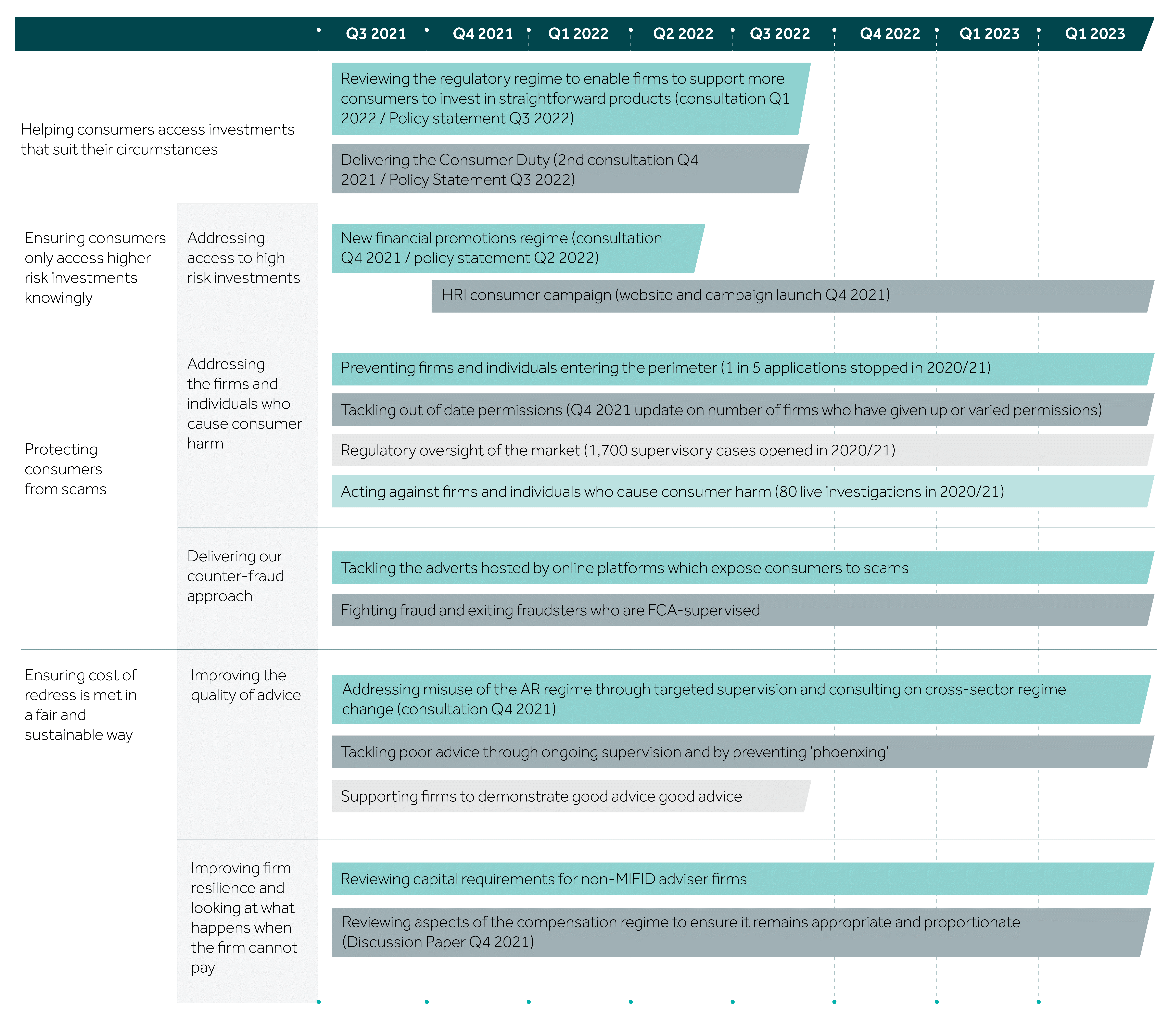On 15 September 2021, the Financial Conduct Authority (FCA) published a new strategy which is designed to ensure UK consumers can invest with confidence by understanding the risks they are taking and what the regulatory protections apply (Strategy).
Whilst the FCA note that it does not restrict consumer choice, the Strategy does propose a number of measures which aim to allow consumers to access and identify investments that suit their investment objectives and their access to risk.
Consumer Harm
In the Strategy, the FCA identifies a number of areas of significant consumer harm:
- Consumers are losing significant sums of money to investment fraud and scams. 23,378 consumers reported they lost an estimated GBP569 million to investment fraud from April 2020 to March 2021 - an almost threefold increase since 2018.
- Consumers are looking for help in avoiding scams or dealing with their consequences. The number of calls the FCA has received from consumers on scams has doubled since 2016/17.
- Many consumers who might gain from investing currently hold their savings in cash. There are 15.6 million UK adults with investible assets of GBP10,000 or more. Of these, 37% hold their assets entirely in cash, and a further 18% hold more than 75% in cash. Over time, these consumers are at risk of having the purchasing power of their money eroded by inflation.
- Other consumers are investing in higher risk investments, many without realising the risks. 6% of adults increased their holdings of higher risk investments during the pandemic. Yet research conducted for the FCA revealed that there is a lack of awareness of the risks associated with investing, with 45% of non-advised investors failing to recognise that ‘losing some money’ was a risk of investing.
- The characteristics of investors are changing, as well as the way they invest. Younger people are twice as likely to have invested in higher risk investments than adults overall. For example, 44% of cryptocurrencies and 31% of crowdfunding investments are held by people under 34.
- Financial advice is not reaching all parts of the market. Half of UK adults with GBP10,000 or more of investible assets (around 8.4 million people) did not receive any formal support to help them make investment decisions over the last 12 months. Only 8% of UK adults received financial advice and only 1.3% of adults made use of online robo-advice.
Objectives of the Strategy
By 2025, the FCA will:
- Reduce by 20% the number of consumers who could benefit from investment earnings but are missing out. There are nearly 8.6 million consumers holding more than GBP10,000 of investible assets in cash;
- Halve the number of consumers who are investing in higher risk products that are not aligned to their needs. 6% of consumers increased their holdings of higher risk investments during the pandemic, with 45% of self-directed investors saying they did not realise the risks;
- Reduce the money consumers lose to investment scams perpetrated or facilitated by regulated firms. Consumers lost nearly GBP570 million to investment fraud in 2020/21 – this has tripled since 2018; and
- Stabilise the GBP833 million compensation bill for the Financial Services Compensation Scheme, and target a year-on-year reduction in the Life Distribution and Investment Intermediation (LDII) and investment provision funding classes from 2025 to 2030.
Package of Measures
To achieve objectives of the Strategy, the FCA has set out a package of new measures including:
- exploring regulatory changes to make it easier for firms to provide more help to consumers who want to invest in relatively straightforward products;
- launching a new GBP11 million investment harm campaign, to help consumers make better-informed investment decisions and to reduce the number of people investing in inappropriate high-risk investments;
- being more assertive and agile in how the FCA detects, disrupts and takes action against scammers, thereby reducing investment scams;
- strengthening the Appointed Representatives (AR) regime, with a consultation to be launched later this year, which aims to raise the quality of financial advice;
- strengthening the financial promotions regime in 3 areas; the classification of high-risk investments, further segmenting the high-risk market and strengthening the requirements on firms when they approve financial promotions; and
- reviewing the compensation framework to ensure that it remains proportionate and appropriate, particularly where firms fail leaving behind compensation liabilities for the FSCS to address. This will reduce the cost and impact of poor advice.
 Figure 1: FCA Strategy, Infographic 4: Road map
Figure 1: FCA Strategy, Infographic 4: Road map
Consumer Investments Data Review
Alongside the Strategy, the FCA also published a Consumer Investment Data Review which shows that between 1 April 2020 and 31 March 2021, the FCA’s work to tackle harm, included:
- stopping 48 new firms from entering the market where the FCA identified potential for consumer harm (representing 1 in 5 applications);
- opening over 1,700 supervisory cases involving scams or higher risk investments; and
- publishing over 1,300 consumer alerts about unauthorised firms and individuals.

